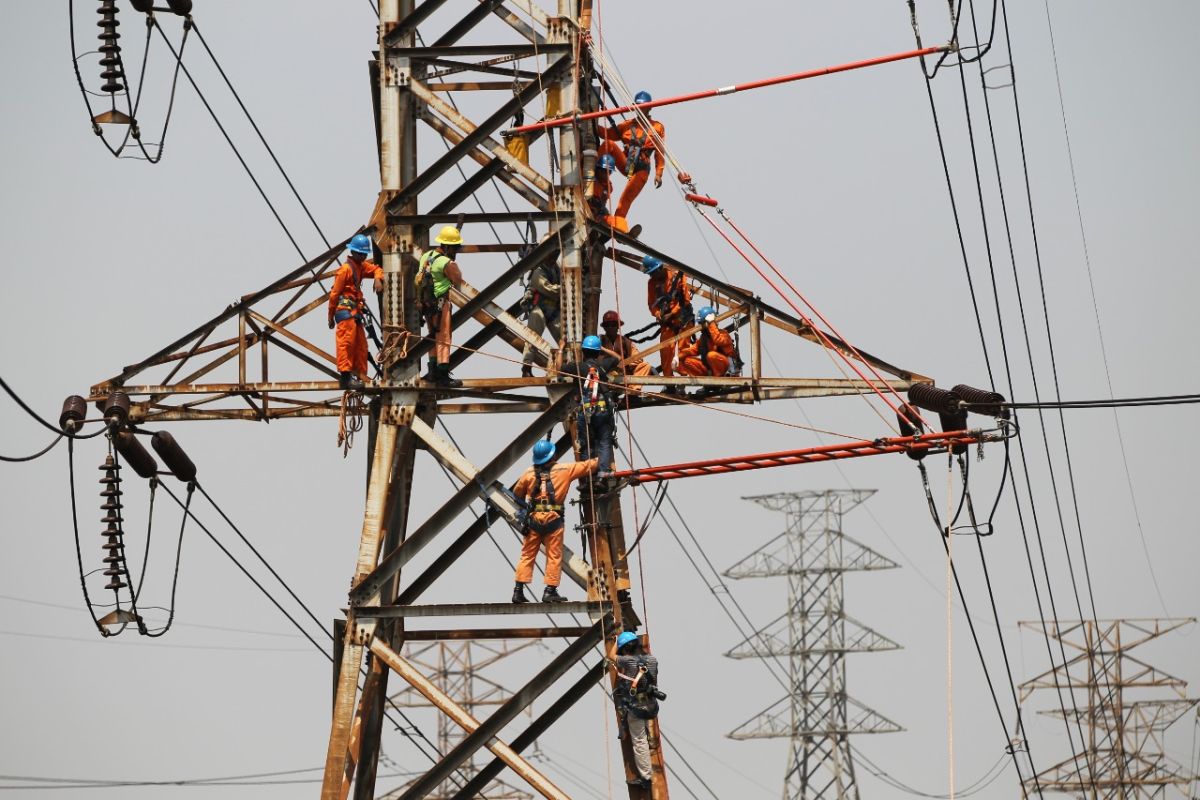On that day, power outage disrupted the Indonesian capital city's commuter line and MRT services, majorly hindering the people's mobility.
Related news: PLN apologize for blackout in Greater Jakarta
Passengers of the Bogor-Jakarta commuter trains, for instance, had to disembark after they came to an abrupt stop owing to sudden power outage.
Rosanelly, one of the affected passengers and mother-of-two, remarked that she and other passengers had to alight from the carriages of their train that suddenly stopped between the Tebet and Manggarai Stations in South Jakarta.
To enable her to get an app-based ojek, or motorcycle taxi, to go to Cipulir area of South Jakarta, Rosanelly decided to walk through the rail track to Tebet Station.
"Due to this major blackout, it was not easy to order an app-based ojek. We should be patient to get our order connected. Luckily, I finally got connected to an ojek driver, who drove me to my destination," she stated.
This 47-year-old resident of Ciomas Sub-district in Bogor District, West Java Province, further admitted to still struggling to get home from Cipulir area.
Rosanelly then decided to take a city bus to South Jakarta's Blok M Bus Terminal, with the hopes of getting inter-city buses serving the Jakarta-Bogor routes from there.
Unfortunately, the expected buses were not available on Sunday, while the commuter train service remained crippled following the power outage.
To avoid getting too late to return home as it grew darker, Rosanelly decided to take an airport bus operated by state-owned public transportation operator PT Damri that departed from the Blok M Bus Terminal to Soekarno-Hatta International Airport.
From the Soekarno-Hatta International Airport, Rosanelly continued her trip to Bogor City aboard another Damri's airport bus.
Rosanelly's personal experience, in fact, bears similarity to so many other Indonesians and foreign tourists, whose mobility got affected by the disruption in public transportation services and traffic lights in Jakarta's greater areas.
This Sunday's major blackout also affected the business activities of several small and medium enterprises (SMEs) that were not equipped with generators to supply electricity.
Dahnil Anzar Simanjuntak, spokesman of the Great Indonesia Movement (Gerindra) Party leader Prabowo Subianto, expressed concern over the impact of this major power outage on SMEs' businesses.
"The SMEs, including 'Begawan Kupie', may have suffered significant losses as a result of this longer blackout. I believe that many other SMEs in Java also suffer losses," he noted on his Twitter account.
Related news: Major blackout does not disrupt Jasa Marga's toll road services
In Australia, if a blackout were to take place, the country's electricity firm would compensate its customers by waiving their electricity charges for a month, while in South Korea, a power outage could pave the way for a minister's resignation, he pointed out.
State-owned electricity firm PT PLN (Persero) has extended its apology over this Sunday's major blackout. PLN claimed that it was caused by the trips on the Suralaya Turbine Gas from number 1 to 6, while its turbine gas number 7 was off.
Simultaneously, the Cilegon Gas Turbine Combined-Cycle (GTCC) Power Plant also experienced a trip or error. As a result, the power outage hit residents living in Jakarta's greater areas.
The major blackout also hit those residing in West Java Province's areas due to troubles experienced in the 500 kV Ultrahigh Voltage Transmission. The affected areas comprise Bandung, Bekasi, Cianjur, Cimahi, Cirebon, Garut, Karawang, Purwakarta, Majalaya, Sumedang, Tasikmalaya, Depok, Gunung Putri, Sukabumi, and Bogor.
At around 4:50 p.m. local time on Sunday, electricity returned to normal for those living in the city of Bogor and certain parts of its surrounding areas.
Related news: Cause of major blackout remains under police investigation
Unlike many SMEs potentially suffering losses due to the power outage, big state-owned companies, including the toll road and airport operators, survived the major blackout.
State-owned toll operator PT Jasa Marga, for instance, ensured that the major blackout did not disrupt the cashless transaction payments at toll gates.
"Alhamdulillah (Thank God), the cashless transaction system at toll gates that Jasa Marga operates still work normally," Jasa Marga spokesperson Irra Susiyanti informed ANTARA.
The power outage did not disrupt the services at all toll roads that Jasa Marga manages and operates, she explained.
Apart from Jasa Marga's successful story, Sunday's major blackout is really an alarm bell for Indonesia's energy security that is defined by the International Energy Agency (IEA) as "the uninterrupted availability of energy sources at an affordable price."
This Sunday's major blackout exposes Indonesia’s sheer vulnerability in ensuring its energy security. During his administration, President Joko Widodo is expected to be able to solve this crucial problem in his second leadership term. Related news: Backup plan for power distribution must be well-calculated: President
Related news: Government urged to reevaluate national energy resilience strategy
EDITED BY INE
Editor: Fardah Assegaf
Copyright © ANTARA 2019












